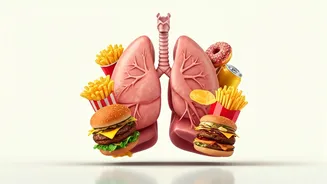Processed Meats' Impact
Processed meats, often enjoyed in sandwiches and snacks, can pose a risk to lung health. These meats often contain nitrates and nitrites, used as preservatives
to extend shelf life and enhance color. When consumed, these additives can generate harmful compounds within the body that contribute to inflammation. Inflammation is a key factor in the development and exacerbation of respiratory conditions. Regularly eating processed meats may lead to increased oxidative stress in the lungs, potentially damaging lung tissues over time. Limiting or avoiding processed meats, such as bacon, sausage, and deli meats, could be a beneficial strategy to maintain healthy lungs and minimize respiratory issues. This dietary change encourages a shift towards fresh, whole foods that support overall well-being and respiratory health.
Sugary Drinks' Effects
Sugary drinks, including sodas, fruit juices, and sweetened teas, can have a detrimental effect on lung health. The high sugar content in these beverages often contributes to inflammation throughout the body, including the lungs. Inflammation can lead to airway constriction, making breathing more difficult. Furthermore, these drinks often lack essential nutrients, providing empty calories instead. Excessive sugar intake can also contribute to weight gain and obesity, which is a known risk factor for respiratory problems, such as asthma and sleep apnea. By reducing the intake of sugary beverages, individuals can minimize inflammation, maintain a healthy weight, and support better lung function. Choosing water, unsweetened tea, or other healthier alternatives can be a simple but effective step towards respiratory health.
Refined Carbs' Role
Refined carbohydrates, like white bread, pasta, and pastries, can be problematic for lung health. Similar to sugary drinks, these foods often have a high glycemic index, leading to rapid spikes in blood sugar levels. These spikes can trigger inflammation throughout the body, including the lungs. Chronic inflammation can cause the airways to narrow, making it challenging to breathe freely. Furthermore, refined carbs provide minimal nutritional value, offering empty calories instead of essential vitamins and minerals. Regularly consuming large quantities of refined carbs could lead to weight gain, adding to the risk of respiratory problems. To support healthy lungs, it's beneficial to limit the intake of these foods and prioritize whole grains, fruits, and vegetables, which provide vital nutrients and support overall well-being.
Dairy Products & Issues
Dairy products, such as milk, cheese, and yogurt, can sometimes cause problems for individuals with respiratory issues. For some people, dairy might increase mucus production, making it harder to clear the airways and breathe easily. The extra mucus can make respiratory symptoms worse, especially for those with asthma or allergies. However, not everyone experiences these effects, and some individuals tolerate dairy without issue. The impact of dairy on lung health can vary greatly depending on individual sensitivities and the specific respiratory condition. People with respiratory problems should monitor their reactions to dairy and make necessary dietary adjustments. Considering alternatives like almond milk or soy milk can be a good choice if dairy causes discomfort, offering a way to minimize potential issues while still maintaining dietary variety.
Fried Foods' Hazards
Fried foods, which include items like French fries and fried chicken, can be detrimental to lung health due to their high fat content and often poor nutritional value. These foods are typically cooked in oils, which can degrade at high temperatures, forming harmful compounds. When consumed, these compounds may contribute to inflammation and oxidative stress in the body, potentially damaging lung tissues and worsening respiratory conditions. Additionally, fried foods are often high in calories and can contribute to weight gain and obesity, which is a significant risk factor for respiratory issues. Choosing baked, steamed, or air-fried alternatives to traditional fried foods can support better respiratory health. These options often provide similar textures and flavors without the harmful effects associated with deep frying, helping maintain a balanced diet that supports overall well-being.
Salty Foods' Impact
Excessive salt intake can negatively influence lung health. High sodium levels in the diet can lead to fluid retention, potentially causing swelling in the body, including the lungs. This swelling can make breathing more challenging and can worsen symptoms for those with existing respiratory conditions. Highly processed foods, like fast foods and many packaged snacks, frequently contain high amounts of sodium. Regularly consuming such foods can increase the risk of respiratory issues. Controlling salt consumption is essential for maintaining healthy lungs. Reading food labels to check sodium levels, limiting processed foods, and using fresh herbs and spices to season meals instead of salt can all contribute to better lung function. Prioritizing a low-sodium diet supports a healthier respiratory system and overall well-being.
Artificial Sweeteners' Effects
Artificial sweeteners, often found in diet sodas, sugar-free candies, and other products, can affect lung health. While marketed as sugar alternatives, some studies indicate potential adverse effects on respiratory health. Certain artificial sweeteners may lead to inflammation, which can affect the lungs and make breathing more difficult. Additionally, some individuals experience sensitivities or allergic reactions to specific artificial sweeteners. It's important to be mindful of how your body reacts to these additives. If you notice any respiratory symptoms after consuming foods or drinks containing artificial sweeteners, it might be beneficial to limit their intake. Choosing natural sweeteners like stevia or monk fruit, in moderation, or reducing overall sweetness in your diet can be a good strategy to support respiratory health and overall well-being. Focusing on whole, unprocessed foods helps avoid these potentially problematic additives.




















